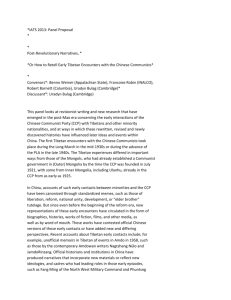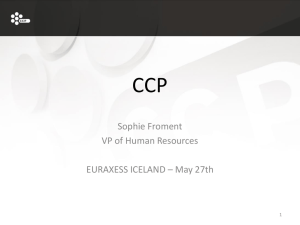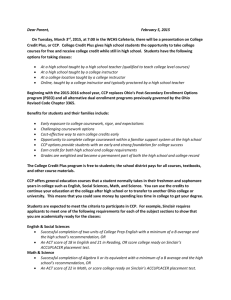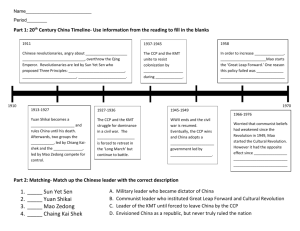Chapter 3 Background of China`s Accounting Development
advertisement
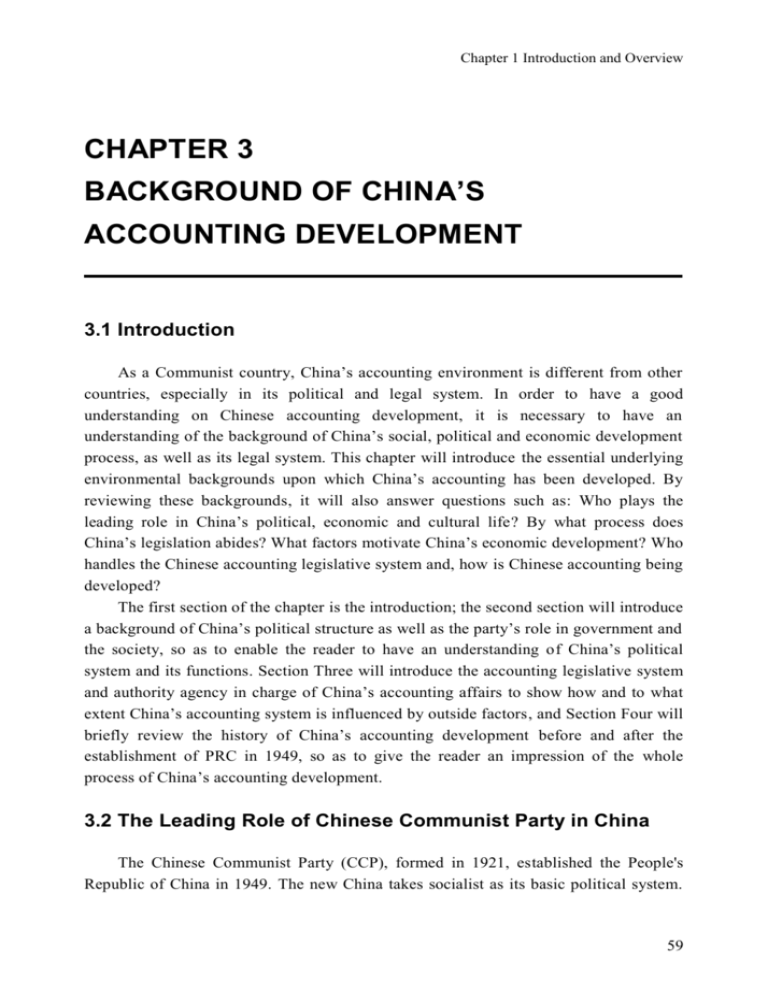
Chapter 1 Introduction and Overview CHAPTER 3 BACKGROUND OF CHINA’S ACCOUNTING DEVELOPMENT 3.1 Introduction As a Communist country, China’s accounting environment is different from other countries, especially in its political and legal system. In order to have a good understanding on Chinese accounting development, it is necessary to have an understanding of the background of China’s social, political and economic development process, as well as its legal system. This chapter will introduce the essential underlying environmental backgrounds upon which China’s accounting has been developed. By reviewing these backgrounds, it will also answer questions such as: Who plays the leading role in China’s political, economic and cultural life? By what process does China’s legislation abides? What factors motivate China’s economic development? Who handles the Chinese accounting legislative system and, how is Chinese accounting being developed? The first section of the chapter is the introduction; the second section will introduce a background of China’s political structure as well as the party’s role in government and the society, so as to enable the reader to have an understanding of China’s political system and its functions. Section Three will introduce the accounting legislative system and authority agency in charge of China’s accounting affairs to show how and to what extent China’s accounting system is influenced by outside factors, and Section Four will briefly review the history of China’s accounting development before and after the establishment of PRC in 1949, so as to give the reader an impression of the whole process of China’s accounting development. 3.2 The Leading Role of Chinese Communist Party in China The Chinese Communist Party (CCP), formed in 1921, established the People's Republic of China in 1949. The new China takes socialist as its basic political system. 59 Environmental factors in China’s Financial Accounting Development since 1949 Since then CCP has been the leading core in China’s political, economic and social life, and China’s socio-economic life is influenced and colored by politics afterwards. • The relationship between the CCP and the government “The Chinese Communist party is the primary political force in China. Unlike parties in Western democracies, it is a tightly organized movement that controls and leads society at all levels. The party sets policy and controls its execution through government officials who are also party members. The effect is to make the government an organ of the party”. 1 Although “more authority was concentrated in the central government under the State Council. Real power, however, lay with the Communist Party, especially the Central Committee. This Committee held together the triad of power-army, government, and party”. 2 All the institutions including the National People’s Congress (NPC), State Council and related Ministries and Bureaus are under the leadership of CCP. In China the slogan “The core energy of leading our undertaking is Chinese Communist Party, and the basic theory of guiding our thought is Marxism-Leninism and Mao Zedong’s Thought”3, is well known by anyone at one time or another. And now the directing thought of the Party is based on Deng Xiaoping's theory4. The organizational structure of the CCP and its relationship with the government can be shown in figure 3-1. “The Chinese Communist party is organized as a hierarchy, with power concentrated at the top. Above the local units, or cells, is a pyramid-like structure of party congresses and committees at various levels, culminating in the National Party Congress. Prior to 1982, the highest party office was that of chairman, held for more than 25 years, through most of the People's Republic's history to that time, by Mao Zedong. In an effort to ensure that the power Mao had enjoyed was never again concentrated in one person, a new party constitution adopted in 1982 abolished the 1“Chinese Cultural Studies: Concise Political History of China”, file:///X/downloaded articles about China/Chinese Cultural Studies concise political history of China.htm. 2 Same as 1 3 The author’s own experience. Mao’s thought is said to be the application and development of Marxism-Leninism in China. The main contents of Mao’s thought include: 1) Theory of new democratism revolution; 2) Theory of socialist revolution and construction; 3) Theory of construction of revolutionary Army and military strategy; 4) Theory of politics and tactics; 5) Theory of ideological and political work and cultural work; 6) Theory of Party’s construction. 4 Deng’s Theory is said to be the successor to Mao Zedong’s Thought, and the new stage of Marxism-Leninism’s development in China. The core of Deng’s theory is the theory of constructing socialist theoretical system with distinctive Chinese characteristics. It systematically answered such questions as the road and stages of socialist development, the essential task, and the promoting forces, outside condition, the political guarantee, strategic procedure, the leadership and backing force of the Party as well as the union of the county. The Party’s fundamental guideline under the primary stage of socialist was established according to Deng’s theory. 60 Chapter 1 Introduction and Overview chairmanship and replaced it with the administrative position of general secretary to the Secretariat”5. Figure 3-1: Organizational Structures of CCP and Its Relationship with the Government (Source: Susan L. Shirk, The Political Logic of Economic Reform in China) Thin lines indicate weaker authority. The relationship between the CCP and the government is as Li (Li, 1997:39) described: The CCP is the leading core of Chinese socialist revolution and socialist construction. The CCP’s leaderships include the leaderships on politics, thoughts and organizations, of which the most important is the Party’s political leadership on the entire state and the government. Political leadership means political principles, political directions, the leaderships on the most important decisions and recommendation the most important cadres to the governmental organizations. The party’s authority over the government is primarily based on its authority to appoint and promote government officials. The party also sets the general policy line for the government budget and plan, and oversees the work of the government. Finally the party is responsible for the ideological education and evaluation of government cadres and all other members of society" (Shirk,1993:56). 5 Same as 1. 61 Environmental factors in China’s Financial Accounting Development since 1949 In return, one of the basic principles of the government’s works is “insisting on the CCP’s leadership, which means the CCP’s political leadership in various levels of the governments, and the CCP’s organizational leadership in all levels of the governments must be guaranteed” (Li,1997:40). All major and important general and specific government policies, and all major questions concerning the Government's work, must first be submitted to the central (party) authorities for examination and approval. And only after the relevant discussion are carried out by the central authority, and the relevant decisions or approval given by the central authorities, can major and important general and specific government policies be implemented (Zhou, 1987:18). “The CCP organization extends to all corners of Chinese society and can be perceived as the way that order is maintained in China”(Yabuki, 1999:35). The CCP’s control over nonparty organizations can be demonstrated in figure 3-2. Figure 3-2: CCP Central Controls Over Non-CCP Units (Source: Yabuki, 1999:35, CCP Organization Dept., Chart of Cadre Assignments for Positions Under Control of Party Central, doc. 2, 1990) Figure 3-2 shows the ways in which the CCP exercises control over non-communist organizations. First, with respect to governmental administrative institutions, “party organization” exists in the State Council (comprising the premier, vice premiers, and other State Council members), and the State Council plenary meeting organization (including, apart from the standing committee members, the ministry of the finance, foreign affairs, and other ministries). “All-important decisions must be approved by the party organization before being implemented. In the provinces, provincial party committees parallel provincial government organizations, and all government decisions must be approved by the party committees before an action can be taken”. “The Communist Party organizations that control these governmental personnel carry out 62 Chapter 1 Introduction and Overview “management of different levels” through a three-level hierarchy: the Politburo level, the Central Organization Department, and province-level party organization departments (including party organizations in each ministry under the State Council)” (Yabuki,1999:35). Secondly, “with respect to lawmaking institutions, CCP committees are established within the NPC and complementary National Political Consultative Congress and provide “guidance”. Within the courts and the procuratorate, Communist Party committees are established, as they are within such mass organizations as trade unions, women’s organizations, and youth organizations”(Yabuki, 1999:35). • The relationship between CCP and NPC The National People’s Congress is the essential political system of contemporary China. According to the Chinese Constitution, all the rights of PRC belong to the people. The National People’s Congress and Local People’s Congress at all levels are the supreme agency in which people exercise the state’s rights, and the NPC has the authorities of making country’s policies and decisions, and also exercises the country’s legislative rights. The horizontal structure of the central authority of the State can be shown in figure 3-3. Figure 3-3: Horizontal Structure of the Central Authority of the State (Source: Yuan Jicheng, Contemporary China’s Political System, Central Broadcasting and Television University Press, 1994,P50). While “The National People’s Congress and its Standing Committee is under the leadership of the CCP, representing the interest of people, to manage the State directly. Its commission is to guarantee the implementation of Constitution, law, as well as the CCP and the State’s guiding principles and policies”(Guo, 1998:42). The Party’s control over the NPC has formed since the establishment of the new China in 1949. Early in 1949 when National People’s Congress convened, Central Party and Mao Zedong have pointed out emphatically that not only the CCP’s leadership should be insisted on but also democracy should be promoted, and underlying principle is ‘not 63 Environmental factors in China’s Financial Accounting Development since 1949 only the CCP’s leadership is guaranteed but also the spirit of democracy is cultivated’. No matter it is the meeting of public figures from various circles or the People’s Congress, the members of CCP won’t be too many, so as to guarantee the adoption of the resolutions (Guo, 1998:100). The Party in power realizes its leadership in the NPC in the following ways: First, the Party proposes suggestions of policies and personnel affairs to the government authority agency; second, the Party’s members and cadres should guarantee the Party’s suggestions and opinions being converted to the will of the State, being converted to law and being implemented by their own efforts, as the most important posts are held by the Party’s cadres, majority of the representatives in People’s Congress are Party’s members, by Party’s members’ explaining, persuading and propagating to the non-Party’s members in the Congress to gain the support and to achieve the agreement with the Party’s suggestions and maintenances; and finally the Party’s representatives in Congress are disciplined strictly so as to make sure all the Party’s representatives to act in unison. The Party can’t command the State Agencies but can command the Party’s members and its cadres in the State Agencies (Guo, 1998: 100). Based on the features described above, many properties of a totalitarian oligarchy can be found in China’s situation according to Shill’s (1966) classification on political systems (see Chapter 2). From the properties of China’s legislature, executive, judiciary, power elite, opposition, to the mechanism of authority, public opinion, and civil order, all these aspects reflect that China is under a totalitarian oligarchy political system. For example, China’s legislative function is similar to an acclamatory and ceremonial one. According to the Chinese constitution, the National People’s Congress exercises legislative rights. While the majority of the representatives in the People’s Congress are party members, it should be noted that all legislations and decisions are passed unanimously according to the Party’s will. Therefore there is no doubt for the saying that “The Party committee waves its hand, the government gets to work, the people’s congress standing committee votes, and the people’s consultative congress claps” (Wang, 1989:7). From the aspect of executive and power elite properties, government officials, the majority of whom are party members, are promoted by the CCP. All major and important general and specific government policies, and all major questions concerning the Government's work, must first be submitted to the central (party) authorities for examination and approval, and the members of the party should be loyal and coherent to the Party, which has set a stringent restriction on its members. As for the aspect of mechanism of authority, the Party supervises members, nonmembers, government leader as well as bureaucracy. These examples show that all aspects of China’s political, 64 Chapter 1 Introduction and Overview economic, legal and cultural life are under the CCP’s tight control, and this may well demonstrate the characteristics of a totalitarian oligarchy political system. The situation has changed much since 1979; the State, under the guidance of Deng Xiaoping's theory, has undergone a series of political and economic reform. Although hard and tortuous, the attempt to separate the function of the Party and the government has achieved certain progress. At the Eleventh Plenum of the Party’s Congress, such problems as the amalgamated Party, Government, and business, the Party taking the place of the government, and the government taking the place of the business has been addressed. The new Party’s Constitution, passed in the Twelfth Plenum in 1982, stipulates: The leadership of the Party mainly concentrates at the ones of politics, thoughts, and organizations. The party must formulate and carry out the correct lines, policies and strategies, do its best at Party’s organizational, propagandist and educational work, play the exemplary role of a Communist in every work and social activities. The Party must act within ranges of the Constitution and the law. The Party must guarantee that the State’s legislation, judicature, executive agencies, economic and cultural organizations as well as people’s organizations work actively, independently and coordinately (Guo, 1998:272). Beginning in approximately 1980, more of the bargaining over specific economic policies was shifted to the government arena. The CCP leadership still set the overall policy line of economic reform, which was approved in Central Committee meetings, and the Finance and Economics Leadership Small Group, which straddled party and government, had to approve the most important economic reform policy decisions (Shirk, 1993:63). In 1986, with the progressing of political reform, further separation of the work of party and government was made. In 1987 the Thirteenth Plenum of the Party proposed the idea and test of separation of the Party and the Government, and pointed out the key of the political system reform is the separation of the Party and the Government, that is to separate the function of the Party and the Government, and the Party’s leadership is to exercise leadership on politics, that is the leadership on political principle, political direction, and the most important decisions, and recommendation the most important cadres to state authority agencies”(Guo,1988:115). "In enterprises, the party took administrative responsibility from party secretaries and restored it to managers. At the center, the CCP constitution was revised to eliminate gradually the party groups within government agencies" ("Draft Revision"1987). But these changes are only to improve the quality of decision-making by putting the government on a longer leash. And this test stopped in 1989 because of the political struggle within the party. “The announcement of strengthening the Party’s construction 65 Environmental factors in China’s Financial Accounting Development since 1949 made by Central Party made the political core and leading position of the party’s organization clear, part of the leadership systems amalgamating party and executives came back” (Guo, 1998:273). Until the spring of 1992, Deng Xiaoping’s remarks 6, which were made during his inspecting excursion in South of China, caused a surge in China’s reform, and opened China to modernization construction. The political report at the Fourteenth Plenum of the Party in 1992 defined that in order to correspond with the reform of economic systems and the developments of the economy, the political reform must be promoted actively according to the requirement of a combination of democratization and legalization. The report at the Fifteenth Plenum of the Party in 1997 further made clear and definite that from the present onwards, the main task of political reform was to promote democracy, strengthen the legal system, put the separation of politics and business into practice, simplify agencies, perfect the system of democratic monitor, and safeguard stability and unity. The Party’s Constitution, passed at the Fourteenth Plenum of the Party, re-strengthened the Party’s leadership, and insisted on the formulation passed in the Twelfth Plenum that the Party’s leadership mainly concentrated on the ones of politics, thoughts, and organizations (Guo, 1998:274). The Sixteenth Plenum of the Party achieved the consensus on the revision of the Party’s Constitution, which definitely stated that the CCP is the vanguard of the Chinese worker class, and the vanguard of Chinese people and nationality at the same time, and is the leading core of Chinese socialist construction with Chinese characteristics. It represents the developing demand of Chinese advanced productive force, represents the going forward direction of Chinese advanced culture, and represents the essential interest of Chinese broadest masses (The three present) 7; CCP takes Marxism, Leninism, Mao Zedong’s thought, Deng Xiaoping’s theory and “the Three Presents” as its guide of action, and strengthened that the important thought of “three presents” should be consisted in by CCP for a long term; and to construct a society with comparatively good The main contents of the Deng’s talk include: Firstly, the line, the guiding principles and the policies made in the Third Plenum of the Eleventh Party Congress should be insisted on and keep unchanged for one hundred years. The key is to insist on one hub, which is economy construction, and two basic points, which is the Party’s basic line and the Four basic principles, which include insist on the Party’s leadership, insist on the socialist road, insist on proletariat dictatorship, and insist on Marxism-Leninism and Mao Zedong’s Thought. Secondly, more courage should be given to the reform and opening. Trial is to be encouraged. One would dare to trial what to be conceived for certain. More plans or more market is not the essential distinction between socialist and capitalist. Thirdly, opportunities should be seized to develop oneself; the key is to develop economy. Science and technology is the first productive force. To develop economy must rely on the science and education. Fourthly, at the same time to the reform and opening, criminal should be hit. Fifthly, the correct organizational line should guarantee China’s political line. And finally, Marxism should be insisted on. (Source: Deng Xiaoping’s Southern Excursion Talk. http://www.gdmc.edu.cn/library/dxp01.htm) 7 Jiang Zemin Proposed the “three presents” in 2000 when he was in Guangdong attending the education meeting of “three stresses” held for the leader cadres of Maomin city. 6 66 Chapter 1 Introduction and Overview living standard is also written in the CCP’s Constitution. This may demonstrate that even improvements have achieved much, but the essential characteristics of the totalitarian oligarchy political system in China have not been changed. This may have and will still have exerted a strong effect on China’s accounting systems and its development. 3.3 China's Accounting Legislation System and Authority Agency The development of Chinese accounting system can be divided into two distinct periods with different legislation characteristics and contents. The year of 1979 could be the watershed of the two distinct periods. Before 1979, China’s economic system had been a planned socialist; the Party and the Central Government were the chief designers and conductor of China’s economic system. The Central Government Political Bureau financial committee and the Ministry of Finance within the Central Government, which was established at the beginning the PRC, were authorized agencies in managing the national-wide accounting work. Unified accounting systems, which was a state controlled and tax driven financial reporting system served for the planned economy are exercised, but these unified accounting systems were only unified within the sectors, and were drafted by different sectors of the national economy, then approved and implemented by the MOF. The State Council and the MOF were the only issuers of accounting systems and regulations during this period. After 1979, the economic system reform and open door incentives gradually evolved China’s economic and legal system along with an accounting legal system. In 1985, the NPC issued PRC Accounting Law. This was the beginning of the Chinese accounting legal system construction. The accounting system reform, which turned the Chinese accounting system to a capital market oriented financial reporting system, served for the market-oriented economy in 1992, and brought China’s accounting system more towards standardization and internationalization. Three tiers of accounting legislations system had been formed in China so far, which can be shown in figure 3-4 (page 77). In contrast with the old accounting system, the new accounting regulation system is being developed towards a legal one. The first tier is accounting law, which was issued in 1985 and revised in 1993 and 1999 separately by the National People’s Congress, who had the highest legislative authority in China. PRC Accounting Law has become the basic law of accounting in China, and has become the basis of China’s accounting work and other related accounting regulations. It defined the essential targets of the accounting work, jurisdiction of accounting management, accounting entity, the 67 Environmental factors in China’s Financial Accounting Development since 1949 essential requirement of business accounting and accounting supervision, the jurisdictions and responsibilities of accounting personnel. The newly revised Accounting Law in 1999 proposed that a state uniform accounting system should be implemented, and the Ministry of Finance has the authority to formulate the uniform accounting system, which included business accounting, accounting supervision, accounting agency, and accounting personnel as well as the management on accounting work. Figure 3-4: The Structure of Chinese Accounting Legislation System The second tier is the executive regulations, which is formulated by the State Council and the Ministry of Finance. It forms conceptual framework and general principles of accounting, which mainly include: Regulations on General Accountants, issued in 1990 by the State Council; The Trial Regulation on Special Position of Accounting, issued in 1986 by the State Council; Enterprises Accounting Standards, issued in 1992 by the Ministry of Finance, which also possessed the nature of the executive regulations; and Regulations on Business Accounting Statement, issued in 2000 by the State Council, as well as the detailed accounting standards. By the end of 2003 MOF had promulgated seventeen-detailed accounting standards. The third tier is comprised of the uniform accounting systems, authorized by the PRC Accounting Law and formulated by the MOF. It includes 13 sectors accounting systems, while there were about 40 different accounting systems before the reform. It set the rules of accounting work for related national departments, and its main contents were the explanation of the usage of the accounts, accounting statements and its preparation. Though the necessity of these uniform accounting system’s existence is still in argument, they have played a very important part in China’s accounting work after the accounting reform, thus further reform has been taken. Three accounting systems, 68 Chapter 1 Introduction and Overview including Business Accounting System, Finance and Banking Business Accounting System and Small Business Accounting System are going to be promulgated to cover the whole sectors of national economy and all kinds of business. So far, the “Business Accounting System” and “Finance and Banking Business Accounting System” have been promulgated in 2000 and 2001. The “Small Business Accounting System” has been promulgated in 2004,and will be implemented in 2005. 3.4 Brief History of China's Accounting Development China’s accounting history can be traced back 2000 years ago. The earliest word of “accounting” appeared in Western Zhou Dynasty (11 th century BC to 770 BC). During the Tang Dynasty (AD618-907), there appeared “account book” for recording the annual fiscal revenues. Further development began from the Song Dynasty (AD 960-1279), such as the rather scientific bookkeeping method, and the four pillars accounts, was created. This method formed the basis of traditional Chinese accounting theory. During the Ming Dynasty (AD1369-1644), the bookkeeping method improved, and a new method, ‘Long Men Zhang,’ which was similar to the double-entry bookkeeping method, was later created. Prior to 1911, Chinese society had been feudal for three thousand years, China's bookkeeping style, which was single-entry records based on the movement of money or physical goods-dominated, prevailed, while all book-keepers were the products of the master-apprentice training method. At the beginning of the 20 th century, Western accounting methods such as the debit and credit double entry system was introduced to China, and Western accounting and auditing theories were adopted. Many Western countries had established concessions in China, causing an inflow of Western technology and capital, and fostering the development of indigenous industries. Scholars who had received their education abroad returned to China and pioneered modern accounting education. Gradually, accounting majors and departments were established, with bookkeeping and accounting courses taught at the university and college levels. Contemporary accounting texts were introduced and double-entry bookkeeping was established. The first professional public accountants also appeared at this time. Certification was granted to those passing a qualifying examination and entitled the bearer to run an accounting firm and to offer accounting services to clients (Wei, 1991). Legislation in finance and accounting were thus improved. Some laws such as Accounting Law (1935), Auditing Law (1938), Budgeting Law (1938), Final Accounts Law (1938), and Public Depository Law (1938), were publicized. The Civil Government published the Unified Accounting System for All Departments in Central in July 69 Environmental factors in China’s Financial Accounting Development since 1949 19378. However, modern accounting methods had not been fully developed in either accounting education or practice, and as being a semi-colonial and semi-feudal society, China’s economy was not sufficiently developed. All this development stopped and changed to a new direction in 1949, when the Chinese Communist Party established People’s Republic of China. Since 1949, China’s economy has undergone three periods of change: a socialist, centrally controlled, planned economy (1949-1978); socialist commodity economy (1978-1992); and socialist market economy (1992-present). In accordance with the development of China’s economy, the development of China’s accounting system has also experienced change: the “uniform accounting system” (1949-1978), which served for the centrally planned economy; the transition and the construction of accounting norms (1978-1992), which served for the commodity economy; and the construction of a new accounting system (since1992), which served for the socialist market economy 9 towards internationalization. During the process of China’s accounting development, some changes and adjustments were made in order to respond to China’s political and economic movements and development. The process of China’s accounting development after 1949 will be narrated and analyzed in the next chapter. Guo Daoyang, China’s accounting reform in 20the century. Source: http://www.e521.com/library/11/1102/0723100627.htm 9 Wang Guangyuan, Wu Liansheng, “Fifty years of Chinese Business Accounting Norm Construction”. Source: fifty years of China's accounting.htm 8 70
